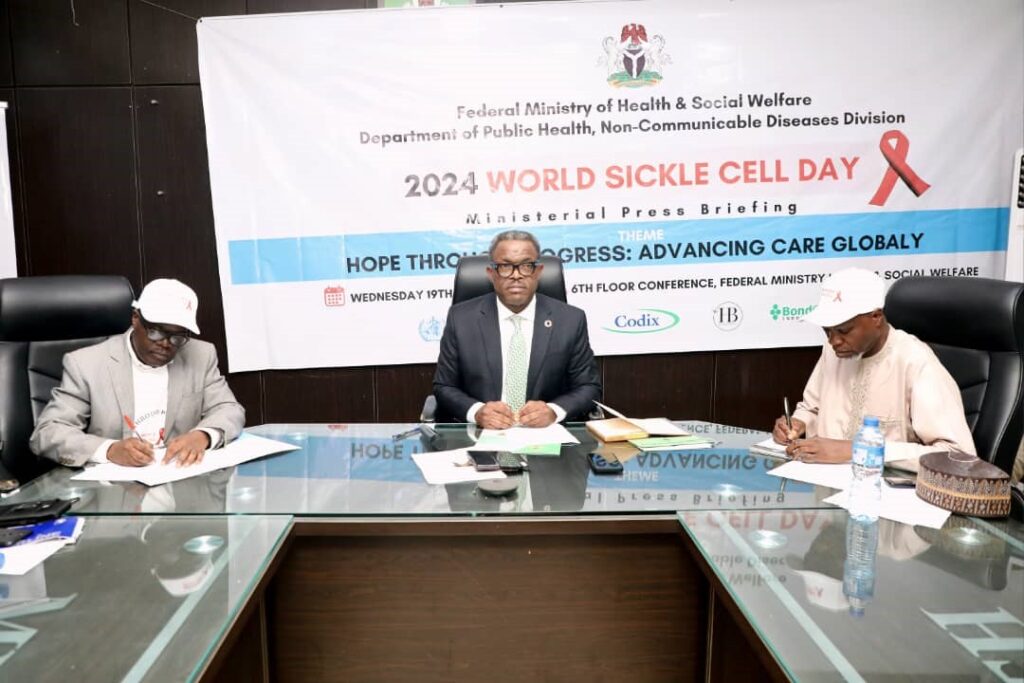NIGERIA LEADS IN GLOBAL EFFORTS TO COMBAT SICKLE CELL DISEASE, LAUNCHES COMPREHENSIVE POLICIES
Raymond Enoch
In a determined move to combat the pervasive impacts of Sickle Cell Disease, Federal Government of Nigeria (FGN)has unveiled a series of comprehensive policies and strategic interventions.
The announcement was made at the 2024 World Sickle Cell Day, commemoration in Abuja Nigeria. This marks a significant milestone in the nation’s efforts in the health care sector, aimed at addressing the socio-economic and psychological burdens of the disease.
Coordinating Minister of Health and Social Welfare, Prof. Muhammad Ali Pate, represented by Dr. Chukwuma Anyaike, emphasized the urgency of these measures. The event which theme is “Hope through Progress: Advancing Care Globally,” highlighted the global health impact of Sickle Cell Disease, which affects nearly 100 million people worldwide, with a pronounced prevalence in the African region.
Nigeria bears the heaviest global burden of SCD, with approximately 100,000 infant deaths annually attributed to the disease, representing 8% of infant mortality.
The nation also accounts for 50% of global SCD births, underscoring the critical need for robust healthcare interventions. According to the 2018 Nigeria Demographic and Health Survey, 25% of Nigerians are healthy carriers of the sickle cell gene, with a national prevalence rate of 1%
The Federal Government’s response includes the development of the first national guidelines for the prevention and control of SCD and the implementation of a Universal Newborn Screening policy. This initiative ensures that all Nigerian children are screened for SCD at birth, a vital step in early diagnosis and management.
Moreover, six centers of excellence for SCD control and management are being established across Nigeria, each equipped with high-performance liquid chromatography (HPLC) and staffed to serve as hubs for newborn screening.
These efforts are complemented by the integration of SCD care into primary healthcare services, following the Nigeria-PEN strategy adapted from the WHO-PEN framework. The strategy encompasses genetic counseling, diagnosis, newborn screening, and a comprehensive care package for SCD, facilitating an efficient referral system.

A Multi-Sectoral Action Plan (MSAP) has been initiated, with Technical Working Committees engaging various stakeholders to address SCD and other non-communicable diseases (NCDs). Additionally, mass mobilization campaigns for awareness creation, genetic counseling, and testing for Hb genotype have been launched nationwide.
Dr. Kelias Msyambota, representing the WHO Country Office, reiterated the global significance of Nigeria’s efforts. In 2022, African Health Ministers initiated a campaign to bolster advocacy and financial resources for SCD prevention and control. The PEN-Plus strategy, adopted in 2022, integrates severe NCD management, including SCD, into national healthcare frameworks, with Nigeria being a priority country for implementation
Nigeria’s strategic interventions reflect a dedicated commitment to reducing the burden of SCD, improving early detection and management, and enhancing the quality of life for those affected. As the nation leads these pioneering efforts, it sets a powerful example for global health initiatives aimed at combating genetic diseases.









